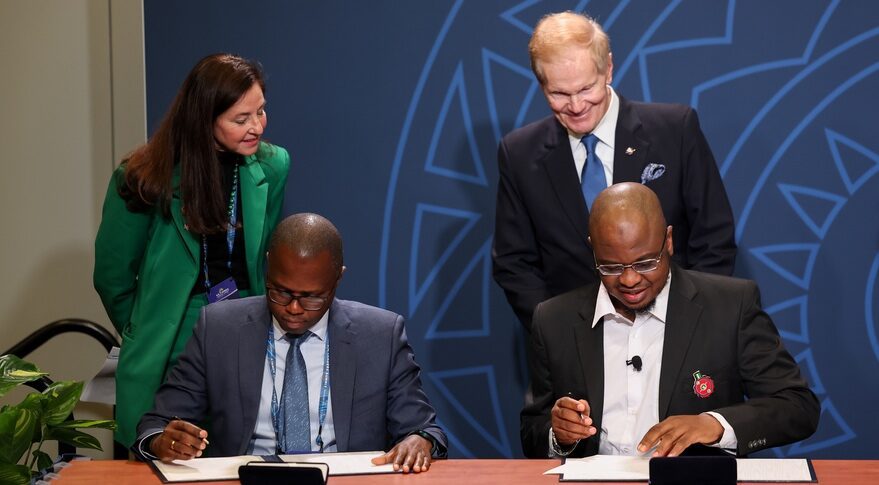Nigeria and Rwanda joined the Artemis Accords, becoming the first African signatories.
Participants at the event, which was a part of the ongoing US-Africa Leaders Summit, explored how peaceful exploration and usage of outer space may help advance shared goals.
The Artemis Accords are a collection of guidelines for the next phase of space exploration, supporting and facilitating the crucial practical implementation of the 1967 Outer Space Treaty’s core obligations.
Read Also: US-Africa Summit: Buhari Restates 2030 Electricity Target of 30 Gigawatts
The Accords recognize the significance of applying best practices and responsible behavior standards, as well as adhering to the Registration Convention and the Rescue and Return Agreement.
Professor Isa Ibrahim, Minister of Communications and Digital Economy signed the Artemis Accords on behalf of Nigeria, while Francis Ngabo, CEO of Rwanda Space Agency, signed on behalf of Rwanda. Assistant Secretary of State Monica Medina, Administrator of the National Aeronautics and Space Administration (NASA) Bill Nelson, and Executive Secretary of the National Space Council Chirag Parikh joined them on the American side. The Artemis Accords have been signed by 23 different governments.

Starlink, SpaceX’s high-speed, low-latency broadband service, is now accessible in Nigeria, making it the first country in Africa to provide the service. This is in support of Nigeria’s objective of giving all its residents broadband access by 2025.
Additionally, the importance of the corporate sector in promoting the US-Africa space collaboration was explored.
There are currently 23 signatories to the Accords, covering the world and representing a variety of space interests and capabilities.
By signing the Artemis Accords, Australia, Bahrain, Brazil, Canada, Colombia, France, Israel, Italy, Japan, the Republic of Korea, Luxembourg, Mexico, New Zealand, Nigeria, Poland, Romania, Rwanda, Saudi Arabia, Singapore, Ukraine, the United Arab Emirates, the United Kingdom, and the United States have demonstrated their commitment to the peaceful, responsible, and sustainable use of outer space and are leading the global discussion regarding the future of space exploration.
Several U.S. firms have lately announced fresh investments in the U.S.-Africa alliance.
In a separate development, Jake Sullivan, the White House’s national security adviser, stated that the United States will invest over $55 billion to promote health and climate adaptation in Africa.
Yesterday, Sullivan made this announcement on the sidelines of the US-Africa conference in Washington, D.C. He disclosed that the United States’ commitment to investing in the African continent is superior to that of other nations.
Sullivan emphasized that the money would be given in close coordination with Congress to a variety of industries to address fundamental concerns.
According to him, the majority of the funds will be allocated to climate adaptation and health. The Biden-Harris administration will contribute over $20 billion to Africa’s health programs.
This includes $11.5 billion to combat HIV/AIDS, more than $2 billion to combat malaria, more than $2 billion to promote family planning and reproductive health, as well as maternity and child health, and more than $2 billion to address the health, humanitarian, and economic effects of COVID-19. Additionally, the administration intends to request $4 billion from Congress for healthcare workers in Africa, investing $1.33 billion annually from 2022 to 2024.
Since January 2021, THISDAY has learned that the Buhari government has invested and is expected to spend at least $1.1 billion to promote African-led conservation, climate adaption, and energy transformation initiatives.
These monies include investments by the U.S. International Development Finance Corporation in Malawi’s Golomoti JCM Solar Corporation as well as a Climate Action Infrastructure Facility, according to Sullivan.
Sullivan added that President Joe Biden would attend a dinner for approximately fifty African leaders on Wednesday evening and announced US support for the African Union’s membership in the Group of Twenty (G20) major economies.



















